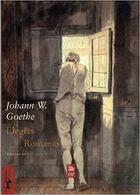
The Roman Elegies constitute one of the most brilliant moments of Goethe's poetry. Due to its metrics, object and purpose "Roman Elegies" represent one of the peaks of the so-called «Weimar classicism» and, consequently, they are also a sign of rejection of romantic sensibility. Goethe wants a natural poetry, that he sings and says nature in his perceptual immediacy: he wants to see nature as sex and landscape. But the "Roman Elegies" are not the writing of a Rome in which nature was love and love nature, but the literary coagulation of a memory that over time becomes reality.
If Schiller finds in the classical world a moment of approximation between art and morality and, consequently, the affirmation of the spirit, Goethe understands that Rome has taught him to separate one from the other as an inexcusable condition for the unconditional affirmation of sensoriality and the mate...read more






